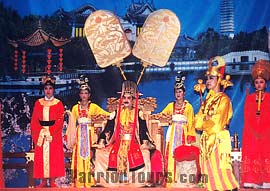Tang Dynasty
As one of the most important dynasties in Chinese history, Tang Dynasty was established by Emperor Gaozu - Li Yuan, with Chang'an (Xian today) as the capital. China had ever been the strongest country in the world, enjoying a history of 289 years. Tang's brilliant culture, politics and economy had great influence on the neighbor countries Silla, Bohai and Japan at that time. As a result, nowadays Chinese people are also named 'Tang people', and in the western countries, the residential places that Chinese people live in are given the name 'Tang Ren Jie'.

![]() Establishment
Establishment
The establishment of the Tang Dynasty, also known as the Glorious Revolution, was caused from the chaos near the end of Sui Dynasty. When Emperor Yang was strangled by one of his subjects, Li Yuan, a vassal in the Sui Court, proclaimed himself emperor and changed the state title to Tang, which began the Tang Dynasty.
After the establishment of the Tang Dynasty, Li Yuan sent Li Shimin to go on punitive expeditions in all directions, destroying almost all the regional independent forces. In 626, Li Shimin, who had made great contributions in the unification, staged a coup at Xuanwumen, and killed Li Jiancheng and Li Yuanji. Later, Li Yuan was forced to abdicate, and Li Shimin took over the throne. Li Shimin was Emperor Taizong, whose reign title was 'Zhenguan'.
![]() Development
Development
After coming to the throne, Emperor Taizong, a wise emperor in Chinese history, exerted himself to make the country prosperous. In military operations, he conquered the Mongolian Plateau under the Turkic group. In politics, he netted a large number of wise and competent ministers no matter what their family background. Those who had surrendered and former ministers were all given important positions, among whom, Wei Zheng, a famous counselor in Chinese history, was one of the examples, who had been counselor to Li Jiancheng previously. In addition, Emperor Taizong adopted the System of Prime Minister, and developed, perfected and established the System of Three Cabinets and Six Departments and the Civil Service Exam System. In the economy, he carried out the Equally Dividing Field System and Taxation System of Payment in kind and labor. Under his rule, the society was steady and the economy was prosperous. So his ruling period was historically named 'Prosperity of Zhenguan'.
However, in the later years of Emperor Taizong, he was worried about his successor. Prince Li Chengqian and King Wei Li Tai were both deposed for fighting against each other for the throne. Li Zhi, the ninth son of Li Shimin, was finally made prince. In 649 Emperor Taizong died, and Li Zhi inherited the throne, becoming Emperor Gaozong. During Emperor Gaozong's reign, Empress Wu Zetian gradually came on the stage, and became the only woman ruler of China.
Originally the Cairen, a fifth - grade concubine of Emperor Taizong of the Tang Dynasty, Wu Zetian entered the palace at the age of 14. She had known Li Zhi when Emperor Taizong was still alive. After Taizong's death, Wu Zetian was sent to Ganye Temple to be a nun. Later, Empress Wang and Concubine Xiao strived for Emperor Gaozong's favor. In order to please Emperor Gaozong, Empress Wang let Emperor Gaozong meet Wu Zetian. After returning to the palace, Wu Zetian succeeded in making Emperor Gaozong depose Empress Wang and Concubine Xiao one after the other. Then, despite opposition from the ministers, Emperor Gaozong crowned Wu Zetian as empress.
Being ill, Emperor Gaozong left Empress Wu to deal with many state affairs. Thus, Wu Zetian gradually grasped state power. In 683, Emperor Gaozong died, and Wu Zetian crowned Prince Li Xian as emperor, who became Emperor Zhongzong. Soon , she dethroned Emperor Zhongzong, and again established the other son Li Dan as emperor who became Emperor Ruizong. In 690, Wu Zetian dethroned Emperor Ruizong, changed the state title to 'Zhou', and named herself Emperor Shengshen. Emperor Wu Zetian reigned for over 50 years, during which time she promoted a large number of officials who ascended to their position through the Imperial Exams. However, in order to preserve her sovereignty, Wu Zetian appointed her nephews Wu Sansi and Wu Chengci as important court officials, and assigned some officials to guard the ministers and the common people. What's more, she always steered away from the Menxia Sheng - examination bureau and Zhongshu Sheng, the legislative bureau, to give orders directly, which destroyed the official system. In 705, Prime Minister Zhang Jianzhi stirred up the palace guard officers, Li Chen and Li Duozuo, and staged a coup, together with Huan Yanfan and Yuan Shuji. Wu Zetian's favorites Zhang Changzong and his brother Zhang Yizhi were killed. Then, Li Xian was acclaimed as emperor again, and Li's dynasty was rebuilt.
However, Emperor Zhongzong was still a puppet after coming to the throne again. The state power fell into the hands of Empress Wei, his daughter, Princess Anle and Wu Sansi. In 710, Emperor Zhongzong died, and Empress Wei crowned King Wen - Li Chongmao as emperor who became Emperor Shaodi. Empress Wei schemed to kill Li Dan, while Li Longji, son of Li Dan, staged a coup with the help of his aunt – Princess Taiping, and killed Empress Wei, Princess Anle and the rest of the Wu family. Then, Li Dan ascended to the throne again.
In 712, Emperor Ruizong, Li Dan, abdicated the crown to Prince Li Longji who was Emperor Xuanzong also named Tang Minghuang. In 713, Emperor Xuanzong killed Princess Taiping and expelled her followers because of a power struggle. Thereafter, the disordered situation was ended, and the Tang Dynasty again entered into a steady developing period. Emperor Xuanzong ruled China for 44 years. In his early years, the society was steady, the economy developed quickly, and the Tang Dynasty rose to its peak, which was historically called the 'Kaiyuan Era'. That period is considered to be the second zenith of Chinese history since Emperor Wudi of the Western Han Dynasty (206 BC - 24 AD), when the capital city Chang'an was the largest city in the world.
Meanwhile in Emperor Xuanzong's later years, he wallowed in pleasure and paid no attention to state affairs. After receiving Yang Yuhuan as his concubine, he indulged himself in wine and women much more. Emperor Xuanzong appointed the incompetent Li Linfu as Prime Minister who served for 18 years, which ruined the imperial court. After Li Linfu's death, Emperor Xuanzong let Yang Guozhong take over the position of prime minister, when the eunuchs began to develop political strength. Craving for greatness and success, Emperor Xuanzong reformed the military system from the Fubing System to the Mubing System, which combined the local military commissioners (Jiedushi) with the army soldiers. Thus, local military commissioners' power was strengthened quickly, among which An Lushan was outstanding. An Lushan was the military commissioner of Fanyang (southwest Beijing today), Pinglu (Chaoyang City of Liaoning Province today) and Hedong (Shanxi Province today), in charge of a large number of forces. In 755, An Lushan launched a revolt against the Tang Dynasty with Shi Siming. Tang Xuanzong escaped to Chengdu, and Prince Li Xiang came to the throne in Lingwu (Lingwu City, Ningxia Hui Autonomous Region today) becoming Emperor Suzong. Then, Emperor Xuanzong was respected as the supreme ruler, while An Lushan also declared himself emperor of Dayan State with Fanyang as the capital. That incident, called the 'An Lushan-Shi Siming Rebellion' was pacified after eight years of fighting.
![]() Decline
Decline
After the revolt, Tang gradually declined, even though the Tang Dynasty experienced a short period of steadiness under the rule of Emperor Daizong and Wuzong later. However, after Emperor Wuzong's death, Emperor Xuanzong inherited the throne with the help of the eunuchs. Emperor Xuanzong tried his best to rehabilitate the Tang Dynasty, while the Huang Chao Uprising broke out in 859, which made the Tang Dynasty exist in name only. The following successors, Emperor Yizong, Xizong and Zhaozong, were all incapable emperors. Emperor Zhaozong was poisoned by Zhu Wen, a military commissioner of the Tang Dynasty.
In 907, Zhu Wen forced Emperor Aidi, Li Zhu, to abdicate the throne, and changed the state title to 'Liang', historically named Later Liang (907 - 923). Zhu Wen made himself Emperor Taizu, making Kaifeng (Kaifeng City, Henan Province today) the capital, after which the Tang Dynasty ended.

